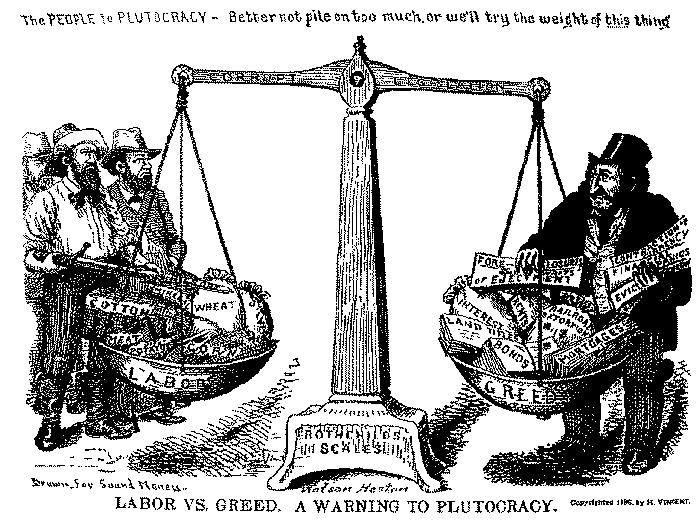
History 2710
Labor, 1890s-1910s

Labor vs. Greed, Southern Mercury (Dallas, TX), July 23, 1896
.Plutocracy was a synonym
for monopolist in the late nineteenth century. In Greek Mythology, Pluto was
the god of the lower world, also known as Hades. Populist newspapers frequently
reprinted particularly good cartoons from other Populist newspapers. Watson
Heston of Carthage, Missouri, drew this illustration for Jacob Coxey's
newspaper, Sound Money (Massillon, Ohio). Henry Vincent, former editor
of the American Nonconformist, which carried many Watson Heston cartoons,
worked for Coxey in 1896, and copyrighted the illustration, which the Southern Mercury of Dallas, Texas, reproduced. Notice that the balance bar
at the top of the scales is labeled "Corrupt Legislation." Populist contended
that it was corrupt legislation that allowed exploiters to steal from
producers. Also, note that the sword in the farmer's hand is labeled the "last
resort." Although farmers expressed considerable anger toward banks and
mortgage companies, very little actual violence occurred. The People's Party
was firmly committed to the democratic process.
(
http://history.smsu.edu/wrmiller/Populism/texts/How_To_Use.htm)
While business leaders like Andrew Carnegie and John D. Rockefeller took advantage of corporations and trusts to increase their wealth and commercial power, mass production and mechanization threatened the economic independence of American workers. Before the Civil War, labor organization had been relatively insignificant. After 1865, however, more and more workers joined unions, went on strike, and challenged collectively the growing power of corporate capitalists in American society.